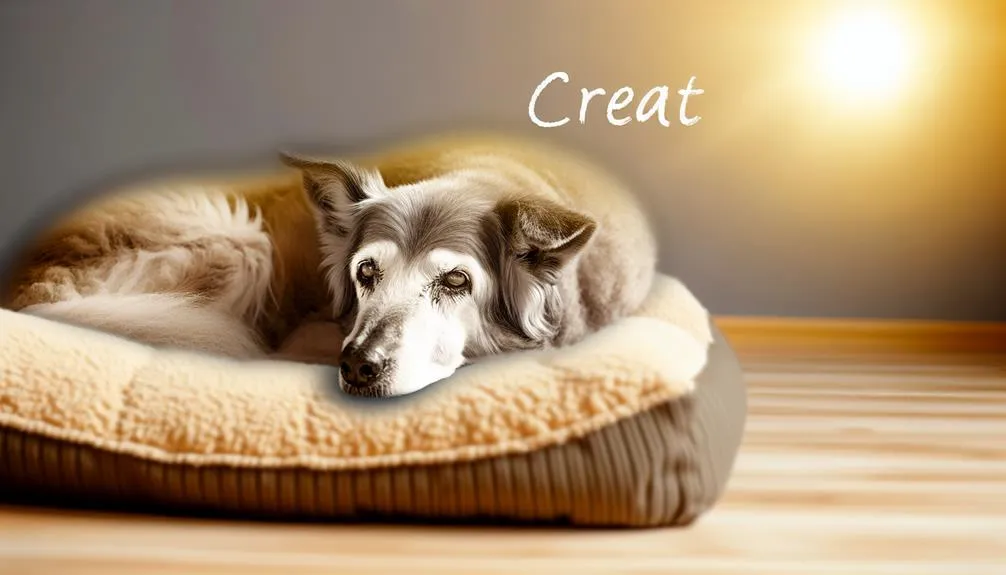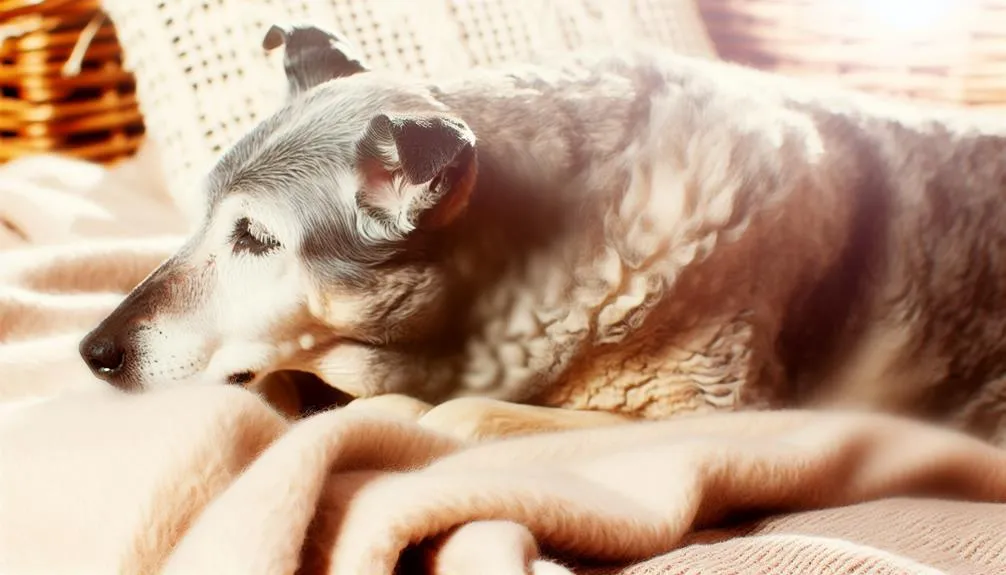
Do Dogs Go Through Menopause
Much like the myth of the fountain of youth, the concept of menopause in dogs raises intriguing questions about their reproductive health. You might wonder if your female dog experiences a definitive end to her fertile years, akin to human menopause. In reality, dogs go through estrous cycles throughout their lives, but these cycles can change as they age. Understanding the nuances of canine reproduction is essential for any pet owner, especially when considering the implications for your dog's well-being in her senior years. What are the signs to look for, and how can you guarantee her health?
Understanding Canine Reproductive Cycles
Understanding canine reproductive cycles is vital for any dog owner, especially if you're considering breeding or managing your pet's health. Canine fertility is influenced by various factors, including age, breed, and overall reproductive health. Typically, female dogs experience their first heat cycle around six months of age, but this can vary. The estrous cycle consists of four distinct phases: proestrus, estrus, diestrus, and anestrus.
During proestrus, you'll notice behavioral changes and physical signs like swelling of the vulva and a bloody discharge. Estrus follows, which is the period when your dog is fertile and receptive to mating. This phase lasts about 5 to 9 days, and it's essential to be aware of the timing if breeding is your goal. After estrus, the diestrus phase occurs, where if your dog is not pregnant, her body will return to a resting state known as anestrus.
Understanding these phases can help you identify ideal breeding times and monitor your dog's reproductive health. Regular veterinary check-ups can also guarantee that any underlying issues affecting fertility are addressed. Additionally, maintaining a healthy lifestyle, including proper nutrition and exercise, plays a significant role in your dog's reproductive health. By being informed and proactive, you'll be better equipped to support your dog's reproductive needs, whether you're planning to breed or simply want to secure her overall well-being.
The Concept of Menopause
In the domain of veterinary science, the concept of menopause in dogs is often misunderstood. While the menopause definition in humans refers to the permanent cessation of menstruation and reproductive capability, dogs experience a different reproductive cycle. Canine females do not go through a true menopause as seen in humans; instead, they undergo a series of estrous cycles throughout their lives, which can diminish in frequency and fertility as they age.
When you think about the human comparison, it is important to recognize that human females typically have a defined end to their reproductive years, often around their late 40s to early 50s. In contrast, dogs can remain fertile well into their senior years, although the likelihood of successful reproduction decreases gradually. This difference highlights a vital aspect of canine reproductive health: while dogs may not experience a menopause in the traditional sense, they can still show signs of aging and hormonal changes that may affect their overall health and behavior.
As a pet owner, you might notice that your dog's heat cycles become irregular or less frequent as she ages. It is important to monitor these changes and consult your veterinarian for guidance. Understanding that menopause, as you know it, doesn't occur in dogs can help you better support your furry friend through her aging process, ensuring she receives the care and attention she needs during this time of her life.
Hormonal Changes in Aging Dogs

As your dog ages, hormonal shifts become increasingly significant, impacting their overall health and behavior. You may notice common symptoms such as changes in appetite, weight fluctuations, or altered activity levels, which can all be linked to these hormonal changes. Understanding these shifts can help you provide better care and support for your aging companion.
Aging and Hormonal Shifts
While many pet owners may not realize it, aging dogs undergo considerable hormonal shifts that can affect their overall health and behavior. As your dog ages, changes in hormone levels can disrupt their hormonal balance, impacting canine longevity and quality of life.
These hormonal shifts can lead to various physical and behavioral changes, including:
- Decreased metabolism and energy levels
- Altered reproductive cycles and potential changes in heat cycles
- Increased susceptibility to certain health issues, such as diabetes or obesity
- Changes in temperament or anxiety levels
Understanding these hormonal changes is essential for managing your dog's health as they age. Regular veterinary check-ups can help monitor hormonal levels and identify any imbalances early on. By maintaining a keen awareness of your dog's behavior and health, you can make informed decisions about their care, ensuring they remain comfortable and happy in their golden years. Supporting your aging dog through proper nutrition, exercise, and veterinary care can greatly contribute to their overall well-being and enhance their longevity. Remember, your dog relies on you to recognize these changes and provide the best possible care during this considerable shift.
Common Symptoms Observed
Recognizing the common symptoms of hormonal changes in aging dogs can greatly enhance your ability to provide appropriate care. As your dog ages, you might notice alterations in her heat cycles. While some dogs may experience irregular cycles or longer intervals between heats, others may stop cycling altogether, signaling the end of their reproductive phase. Understanding this shift is essential for managing her health.
In addition to changes in heat cycles, you may observe various behavioral changes. Your dog might become more irritable or anxious, reflecting hormonal fluctuations. Some dogs may display increased clinginess or, conversely, a desire for solitude. These behavioral shifts can stem from discomfort or confusion related to their changing bodies.
You might also see physical symptoms such as weight gain, changes in appetite, or decreased energy levels. These manifestations can be linked to hormonal imbalances and may necessitate adjustments in diet or exercise. By being attuned to these symptoms, you can guarantee that your aging dog receives the necessary veterinary care and support, ultimately enhancing her quality of life as she navigates this new stage.
Differences Between Dogs and Humans
Understanding the physiological differences between dogs and humans is essential for pet owners seeking to provide the best care for their furry companions. While both species experience hormonal changes throughout their lives, the processes and implications differ greatly.
For instance, consider these key differences:
- Canine Lifespan: Dogs generally have a shorter lifespan than humans, leading to quicker aging processes that can affect hormonal balance.
- Hormonal Changes: Unlike humans, female dogs don't experience menopause in the same way. Their reproductive cycles continue until their later years, but fertility declines as they age.
- Behavioral Impact: Changes in hormonal balance in dogs can lead to behavioral shifts, but these may not be as pronounced or predictable as in humans.
- Health Management: Understanding these differences helps in managing health issues related to aging, ensuring that your dog receives tailored veterinary care.
Recognizing that dogs don't undergo menopause like humans do is critical for understanding their unique aging process. Instead of a definitive end to reproductive capability, female dogs gradually experience a decline in fertility over time. This hormonal balance can influence overall health, mood, and behavior. As a responsible pet owner, staying informed about these differences allows you to monitor your dog's health effectively and make informed decisions regarding their care. Engaging with your veterinarian about these changes can guide you in providing the best possible support for your beloved companion as they age.
Signs of Aging in Female Dogs

As female dogs age, their bodies undergo a variety of changes that can signal the onset of seniority. You might notice shifts in their physical health, which may include weight gain or loss, changes in coat quality, and increased grooming needs. Older dogs often require dietary adjustments to maintain ideal senior health, so consult with your veterinarian about appropriate nutrition.
Behavioral changes are also common. You may observe your dog becoming less active or less interested in social interactions. This can be attributed to a decrease in energy levels or even discomfort from age-related conditions. Adjusting their exercise routines to accommodate their needs while still promoting physical activity is essential. Gentle walks and playtime can help maintain their mobility and mental stimulation.
Cognitive changes may arise as well; some dogs exhibit signs of confusion or anxiety. This could manifest in altered sleep patterns or changes in their response to familiar commands. Regular veterinary visits become important during this stage to monitor for any underlying health issues and to adapt care strategies accordingly.
Lastly, grooming needs may increase; older dogs often require more frequent brushing to prevent matting and maintain a healthy coat. Recognizing these signs of aging allows you to better understand and support your beloved companion as they navigate this new stage in life, ensuring they feel comfortable and secure.
Caring for Senior Female Dogs
Caring for senior female dogs requires a tailored approach that addresses their unique needs as they age. As your dog enters her senior years, it is vital to focus on her overall well-being, guaranteeing she remains comfortable and healthy. Here are some key areas to reflect on:
- Dietary Adjustments: Modify her diet to include high-quality, easily digestible food that meets her nutritional needs. Look for options with reduced calories to prevent obesity, which can exacerbate health issues.
- Exercise Routines: Adapt her exercise regimen to accommodate her energy levels and mobility. Short, frequent walks and gentle play can help maintain her physical health without overexertion.
- Dental Care: Regular dental checkups and at-home dental care are important. Periodontal disease is common in older dogs and can lead to severe health complications if left untreated.
- Mental Stimulation: Engage her mind with puzzle toys, training sessions, and interactive games to keep her mentally sharp. Cognitive decline can occur with age, so maintaining her mental health is just as significant as her physical health.
Additionally, comfort measures such as orthopedic beds can help alleviate joint pain, while regular health checkups allow for early detection of potential issues. By proactively addressing these areas, you'll guarantee your senior female dog enjoys a high quality of life as she ages. Remember, each dog is unique, so tailor these strategies to fit her specific needs.
Frequently Asked Questions
Do All Female Dogs Experience Hormonal Changes as They Age?
As female dogs age, you'll notice hormonal fluctuations that can affect their behavior and health. Understanding these changes is essential for providing the best care during this natural aging process, ensuring their well-being and comfort.
Can Spayed Dogs Go Through a Menopause-Like Phase?
Spayed dogs may experience hormonal fluctuations similar to menopause due to spaying effects. While they don't undergo a traditional menopause, these changes can impact behavior and health, so monitoring their well-being is essential for you.
At What Age Do Dogs Typically Start Showing Signs of Aging?
As your dog enters their golden years, you might notice aging signs around 7 years old. Their energy may wane, and senior health issues can arise. Regular check-ups are essential for monitoring their well-being.
Is There a Specific Breed More Affected by Aging-Related Changes?
Certain breeds show a predisposition to aging signs, like larger breeds experiencing joint issues earlier. You should monitor your dog's health closely, as breed-specific traits can greatly influence the aging process and overall well-being.
How Can I Support My Dog During Her Senior Years?
As your dog enters her golden years, think of her like a vintage car needing special care. Adjust her senior nutrition and exercise routines, ensuring she feels vibrant and loved, embracing this precious chapter together.
Conclusion
In summary, while dogs don't experience menopause like we do, they still navigate their unique reproductive journeys, which can be just as perplexing! As your furry friend ages, staying tuned to her hormonal changes is essential for her well-being. Remember, those "senior moments" aren't just for humans—your dog might have a few of her own! By understanding her cycles and providing the right care, you're ensuring her golden years are filled with joy and tail wags, not worries.
You may also like
Archives
Calendar
| M | T | W | T | F | S | S |
|---|---|---|---|---|---|---|
| 1 | 2 | 3 | 4 | 5 | 6 | |
| 7 | 8 | 9 | 10 | 11 | 12 | 13 |
| 14 | 15 | 16 | 17 | 18 | 19 | 20 |
| 21 | 22 | 23 | 24 | 25 | 26 | 27 |
| 28 | 29 | 30 | ||||
Leave a Reply